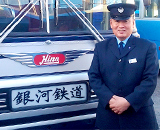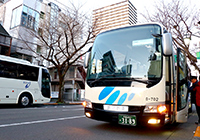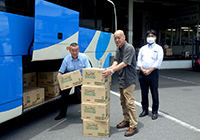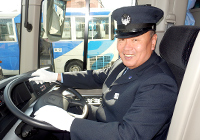
local commuters from the fear of infection during the COVID-19 pandemic
Award summary
Hiroaki Yamamoto (age 57), a manager of the GINTETSU bus company in Higashimurayama, Tokyo operated free commuter bus services for for six months. Using sightseeing buses, operations began on March 12, 2020 when the COVID-19 coronavirus started to spread. The provision of the services ended on September 11, 2020. He continued to operate buses from Higashimurayama Station to the west exit of Shinjuku Station and to the Shin-Marunouchi Bldg. near Tokyo Station every morning on weekdays, although it was difficult to manage his company due to the drastic reduction of demand caused by the pandemic.
Yamamoto provided free commutation bus services because he was saddened by the news that passengers were quarreling because of light coughs in trains during commuting hours amid the COVID-19 pandemic. He wanted those who had to commute for society to worry less about the infections even a little.
He put his idea into action soon after getting the approval of the Ministry of Land, Infrastructure, Transport and Tourism. Passengers were required to sanitize their hands before getting on the bus. The bus was ventilated frequently. Passengers occupied two seats to prevent close contact. Some passengers gave gifts, and others spoke warm words to them. To his surprise, after mass media covered his operation of free commuter busses, people around the country started to cheer them and donations began coming in. Yamamoto's actions inspired Japan as well as the city.
On September 11, 2020, Yamamoto operated the final free commuter bus. He decided to end operations because there were almost no people who had become infected while commuting by train, the number of users was not very large anymore, and the demand for sightseeing buses had begun to recover. He felt satisfied, considering the degree that the company had been able to contribute to the community. Over six months, over 140 bus services were provided, transporting 2400 commuters from Higashimurayama to the center of Tokyo.
There was a bus stop in front of his parents' home when he was a little boy. He began loving busses, seeing them up close every day. He acquired a Class two driver's license at the age of 21. During college, he worked part-time cleaning and deadheading busses, and working as a conductor on them. After graduation, he gave up on a career as a bus driver because bus companies did not employ university graduates at that time. However, he never gave up on his dream. He started working at the liquor shop run by his parents and purchased the used bus he had longed for. Then, he got excited about bus maintenance. He founded GINTETSU, a bus company, himself because others would not employ him. He named his company after the popular anime Galaxy Express 999 because the corporation was established in 1999. Since establishing the company, he has operated city buses along routes that large bus companies tended to avoid, without depending on government subsidies because he wants to contribute to the community through his beloved buses.
His late father told him that he should always think about what he can do for the community and put that into action. He bears this in his mind, and it drives his regional contribution.
When the Great East Japan Earthquake occurred, Yamamoto carried about 2000 volunteer students to quake-hit areas. He wanted the young students to experience volunteer activities at disaster sites. He generously provided his services without charge when other bus companies refused.
He said that he wanted to start bus services between Higashimurayama and Haneda in the future. He thinks that young people will move in the city, and the community will develop if the infrastructure is established. Yamamoto has one new dream after another.
 A total of 2400 commuters used the bus services.
A total of 2400 commuters used the bus services. Many people around Japan supported the activities of Yamamoto.
Many people around Japan supported the activities of Yamamoto. "We would like to contribute to the community through my favorite buses," said Yamamoto.
"We would like to contribute to the community through my favorite buses," said Yamamoto. Mr. Yamamoto took the wheel himself. "The people in front of me are in need of help. I must do something now." His decision was very quick.
Mr. Yamamoto took the wheel himself. "The people in front of me are in need of help. I must do something now." His decision was very quick.Reasons for this award
"I can't stop loving buses." He exudes youthfulness with a depth because he still cherishes his childhood dreams. His company operates fixed-route bus services as public transportation for community members despite running at a deficit, which is compensated for through sightseeing bus services. The COVID-19 pandemic must have caused a dramatic decrease of income. We would like to celebrate the heroism of Yamamoto, who operated free commuter bus services, as long as six months, to the center of Tokyo. His love of buses is as deep as his compassion for the people of the community. It is a ray of light in a world darkened by the pandemic.
Comments from the winner
We are a route bus operator. The provision of route bus services is not profitable, even though it is highly public and plays an important role in local infrastructure. We have compensated for the resulting deficit by operating sightseeing bus services without receiving subsidies (sourced from taxes) from local or national governments. My late father Fujio was from Banshu Ako (currently, Ako-shi in Hyogo) which is famous for the Ako roshi, the lordless samurai of the Ako domain. They fought to the death for a cause, and similarly I believe that providing free commuter bus services during the pandemic is only natural as a Japanese person. I am very pleased to have received this great award.






